Is Cow’s Milk Good for Humans?
I say yes.
Let me preface this by saying that I’m totally cool with you if you choose not to drink milk. I’m not going to come to your house and salmon-slap you for the absence of milk in your fridge. Your body, your choice.
But this is my blog, so today I’m going to share my opinion on the matter of milk and why I think it’s good for humans.
Today’s article is going to be divided into 3 parts – Nature, History, & Nutritional Science.
Nature: Do mammals drink other mammal’s milk?
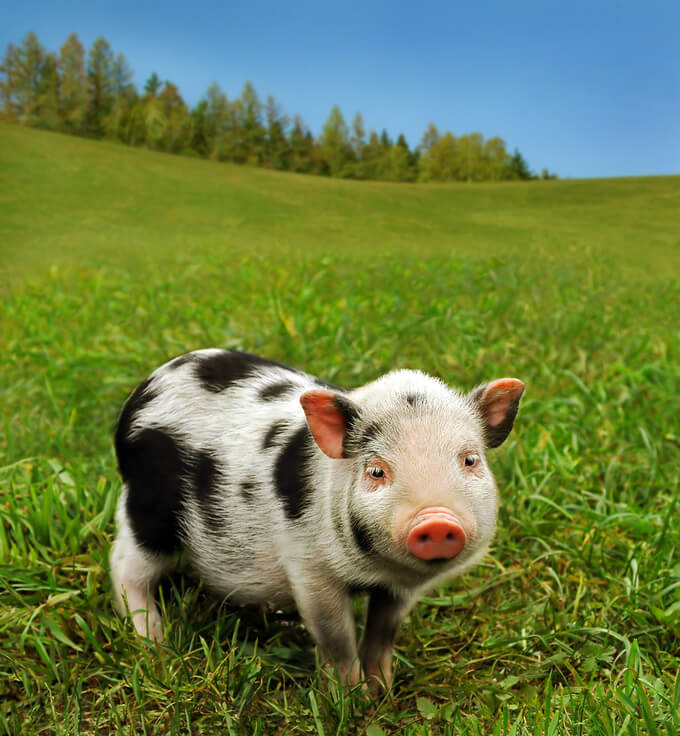
Humans should drink only human milk, end of discussion, right?
I decided to delve into some research from leading experts on the subject of the behavior of other animals when it comes to milk. Here’s what I found:
“Many mammals drink other mammals milk. For instance, pigs are notorious for breaking into the dairy barn just to drink from the cows. Some animals also sometimes nurse orphaned animals of other species. Primates love cow’s milk and ask for it from their handlers. Raccoons prefer it when dumpster diving/scrounging around in cities. The Red Billed Oxpecker perches on the udders of impala and giraffes and drinks their milk. On Isla de Guadalupe, feral cats, seagulls, and sheathbills regularly steal the milk directly from the teats of elephant seals. Carnivore predators fight viciously over the full udders of the nursing animals they’ve hunted down. Most animals would gladly consume milk if you gave it to them; they just lack the access, brain power, and opposable thumbs to obtain it.” -Dawn Gifford, Small Footprint Family
Another argument against milk is that milk is perfectly designed for the animal’s offspring and therefore, it should be the only being that consumes it.
Cow’s milk is richer in protein to support the muscle growth of the calf. Human milk tends to have higher amounts of essential fatty acids to support the complex brain development of a human baby. While I agree with this point that each mammal’s milk is designed differently, I don’t agree that this means the milk cannot do good for other mammals as well.
All food we eat contains a variety of nutrients. Some foods have higher protein. Some have higher carbohydrates. Unfortunately, there isn’t ONE food that provides all of our needs. Humans need a variety of foods. During winter, citrus is in season here in Arizona. The high amounts of Vitamin C we obtain from our citrus helps boost our immunity. Each season, each harvest (whether from an animal or plant) provides a variety of nutrients, but no ONE food can do it all. Such is the same when it comes to milk. It’s just like every other food.
History: Who decided we should drink milk from that dangly thing?
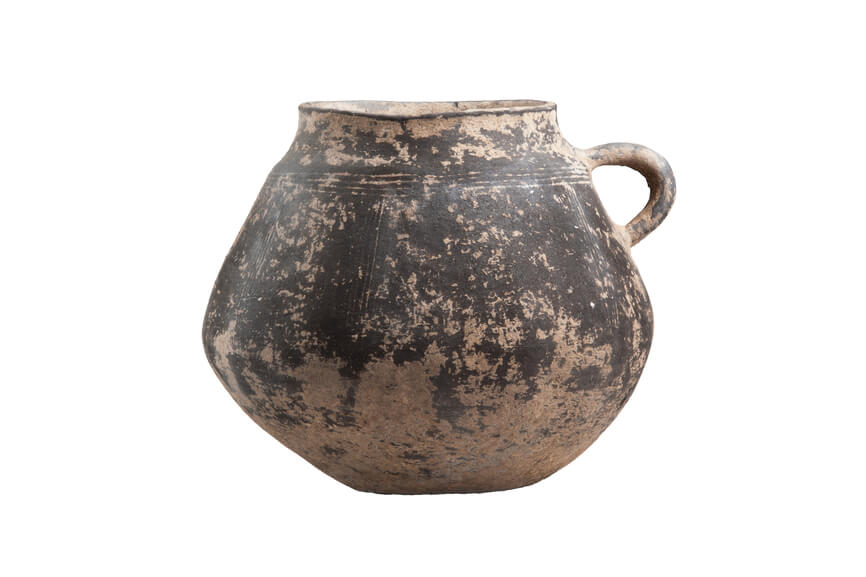
Over the years, humans have tried Yak, Camel, Water Buffalo, Sheep, Horse, Reindeer, Goat, & Cow’s milk. Check out our nutritional comparison between goat, cow, & sheep.
Today, over 65% of the world’s population drinks goat’s milk. Goat’s milk, because of it’s digestibility, is less likely to cause lactose intolerance. Goats are also easier to care for and feed than a cow. Around the world many families take care of their milk needs with just ONE goat. That’s why we own and milk goats here on our farm. They are incredibly easy to keep, and the milk tastes fantastic. No gross tasting milk over here. Check out my article all about raising & milking goats.
Science: Are humans designed to drink milk from other mammals?
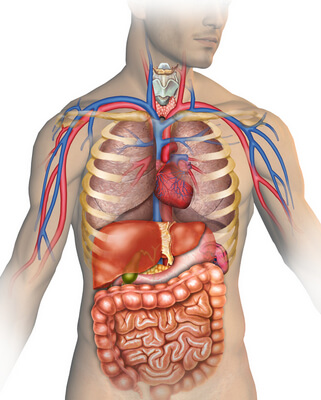
Many people argue that humans aren’t designed to digest milk because we don’t produce lactase. The facts are that humans do, in fact, continue to produce lactase, just in smaller amounts. In my opinion, we don’t need high amounts of lactase because we are not relying SOLELY on milk. We produce just enough to digest the milk we do drink.
Those with lactose intolerance tend to be of African, East Asian, and Native American descent. The good news is, RAW milk contains the lactase enzyme needed to digest the milk completely.
So why all the recent lactose intolerance issues?
I believe this is due to the increase of PASTEURIZED milk in the human diet in the last 100 years or so. Raw milk is perfect in its natural form and because it contains the bacteria needed to produce the enzyme lactase, most people with lactose intolerance notice no issues with raw milk, especially with raw goat’s milk.
“One reason raw milk is so much easier to digest compared to pasteurized milk is due to the presence of lactase, the enzyme that breaks down milk sugar and which many humans are unable to produce. The experts I have spoken with deny the presence of lactase in raw milk; however, it is the friendly bacteria in raw milk that facilitate the creation of lactase in the intestine where it is needed. That is why lactose-intolerant people can drink raw milk without a problem. Pasteurization kills these friendly bacteria.” (source) -Mark McAfee, Organic Pastures
So what about the nutritional aspects of milk? Do humans really need milk for its nutrients?
To talk about the nutritional aspects of milk, you first have to understand the difference between raw and pasteurized milk. Milk that comes from factory farms, full of animals that are confined to stalls indoors, force fed antibiotics and hormones that distort and damage their bodies, can’t really be considered real milk anymore.
“Once you understand how modern milk is produced and processed, it seems logical to just avoid it altogether. But Real Milk–full-fat, unprocessed milk from pasture-fed cows–contains vital nutrients like fat-soluble vitamins A and D, calcium, vitamin B6, B12, and CLA (conjugated linoleic acid, a fatty acid naturally occurring in grass-fed beef and milk that reduces body fat and protects against cancer). Real milk is a source of complete protein and is loaded with enzymes. Raw milk contains beneficial bacteria that protects against pathogens and contributes to a healthy flora in the intestines. Culturing milk greatly enhances its probiotic and enzyme content, making it a therapeutic food for our digestive system and overall health.” (source)
Humans have been supplementing with the milk of other species for 9,000 years. Our ancestors found that milk contained high amounts of much needed nutrients that were hard to find year-round in climates where cold winters or hot summers wouldn’t allow for the growing of plant-based foods. Think for a moment what the purpose of food is. We eat food so we can nourish our bodies.
We think of raw milk as the ultimate supplement. We feed our animals organic hay, provide a pasture for them to graze, let them raise their babies, treat them with herbs and holistic methods, and drink their milk in its natural, raw form. (click here to find out what to do if you can’t find raw milk)
Read here to see How long did YOUR ancestors live while eating BACON, LARD, & WHOLE MILK?
Aren’t there hormones in milk?
Hormones are often thought to be rampant in milk, but this is actually only if the animal is supplemented with the (rBGH) hormone. Cows, goats, sheep, & camels that are raised in a natural environment and not supplemented with hormones have very low amounts of hormones.
And, spoiler alert, hormones are in all foods, even plants. In order for ANYTHING to grow, get bigger, or increase in size, it needs various hormones to do the job. Plants use growth hormones, immune hormones and stress hormones to grow & survive. Some animals even have altered behavior from eating too much plants with natural hormones
The list of phytohormones (hormones in plants) is rather large:
GOITRIN Hormones
- Broccoli
- Rutabaga, Turnips
THIOCYANATES Hormones
- Bamboo Shoots
- Cassava*
- Corn
- Flax
- Lima Beans
- Sweet Potato
- Cruciferous Vegetables:
- Arugula
- Bok choy
- Broccoli
- Broccolini
- Brussels sprouts
- Cabbage
- Canola
- Cauliflower
- Chinese Broccoli
- Chinese cabbage
- Choy sum
- Collard greens
- Horseradish
- Kale
- Kohlrabi
- Mizuna
- Mustard Greens
- Mustard Seeds
- Radishes
- Rapini
- Rutabagas
- Turnips
- Wasabi
- Watercress
FLAVANOID Hormones (apigenin, glucosylorientine, vitexin)
- Chamomile
- Citrus fruits
- Parsley
- Onions
- Wheat sprouts
- Red wine
- Beer
- Soy
- Millet
QUERCETIN, KAEMPHFEROL, RUTIN Hormones
- Capers
- Cranberries
- Onions
- Tea
- Broccoli
- Red Wine
- Currants
- Apples
- Grapes
- Blueberries
- Ginko Biloba
- Apricots
- Grapefruit
- Endive
- Buckwheat
- Asparagus
- Citrus Fruits
Want more hormone lists?
Google “Hormones in all foods”. Actually, wait. Don’t do that. It’s just going to make you crazy. The bottom line here is that there are naturally occurring hormones in all foods. Nothing could grow or be produced without hormones. It’s really the synthetic ones you need to worry about. There are some naturally occuring hormones in foods that need to be properly prepared first before consuming. Soy, if fermented, can be a great addition to the diet, but unfermented soy can give the human body an overabundance of estrogen-like hormones. Broccoli, if steamed, can provide many nutrients, but eaten raw can damage the thyroid and it’s bind to thyroid hormones in the bloodstream.
Finding your answer
If you’re on the fence about milk, I’d urge you to do your own research on the subject, instead of falling for blanket statements condemning all milk. Does milk do a body good? Yes indeed, my friend.
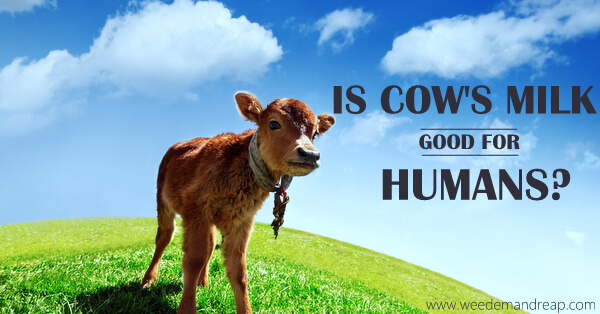
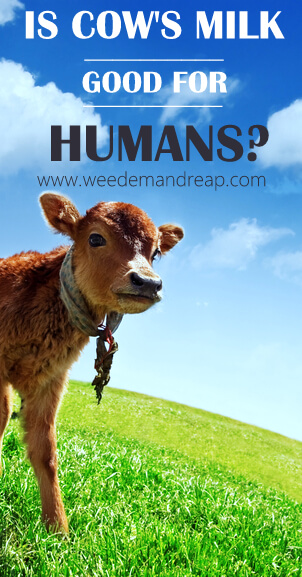

Why are we only mainly producing cow’s milk? Is it because of volume, large animals? Might there be another animal easier to farm, more milk? Pigs, seals, I don’t know. I know we farm goats and sheep, but I mean like any animal, cats, dogs. I heard we have similar digestive systems to a pig, maybe their milk would be better for us than cows?
Very thoughtful article. Thanks. At one point our daughter drank about a gallon of milk daily! She is very healthy.
First I would like to say that I’m not sure why people who don’t drink milk are so compelled to tell everyone else “don’t drink milk”. Now, a little about me. I’m 51yrs old and 2yrs ago I started working out and went about 90% natural in my life style.. My thought is I don’t care if you believe in God or Mother Nature or whatever, you can’t deny the natural order of life. When I do anything now, I ask myself, is it the way our bodies are designed and has human minds and hands touched it. Beef gets a bad wrap because we altered how cows are fed, “they” said eat egg whites, and eat low fat, etc. anytime we try and out smart nature, we lose. Come to find out that 100% grass fed beef has 300-400% more CLA’s ( conjugated linoleic acid, a fat burner you can buy in pill form at GNC) than corn fed beef. “They” discovered that low fat diets can lead to depletion of fat soluable vitamins and not eating the egg yolk can make a girl out of a man because the yolk is loaded with good colesterol that helps produce testosterone in the testicales.
I agree the argument that in nature, only infants drink milk but I do recognize that humans are our own creatures and to my limited knowledge, I believe we are the only species where our digestive system can handle everything (meats,vegetables, fruits, and nuts). With that said, let’s look at nature again. If milk is only for new borns, then why do we have animals that produce milk even when the have not giving birth?
I stopped taking vitamins, protein shakes, and any workout supplement 9 months ago and went strictly raw milk as my post workout drink. I continued to get stronger and bench pressed a personal best of 315lbs right before my 51st birthday. I am 5’9″, weigh around 195, and my wife wonders if I have an endless supply of Viagra. The answer is I have an endless supply of what nature intended before man got so smart, BTW, make sure your milk and beef are 100% grass fed. I buy from a reputable farm. I won’t even buy these products from whole foods.
What animals give milk when they haven’t given birth? Maybe I misread your post…
Yeah, that doesn’t happen. All milk cows are made pregnant in cycles allowing for some non-pregant time- factory farms I’m assuming with smaller resting windows. All lactating cows have given birth in the near past, few months–year? idk. ((just like humans))
I have been consuming raw cow’s milk on and off for almost 15 years. Since this time, no cavities, root canals, gum disease, etc. Teeth like horse. Since I traveled extensively, my sources were varied and I obtained the milk from different farm share programs (but in some states could actually purchase it in markets) throughout the country with absolutely no adverse effects. I have found it to be extremely rejuvenating and love to watch people’s jaws drop when I tell them my age. I have also seen raw milk reverse disease in more than one case and I believe that it helped draw out the PBDEs that made me so ill from sleeping on a conventional mattress for 8 months. Also it tastes amazing! Love the stuff.
Hi DaNelle,
I went to meet my farmer yesterday and its was amazing! I had never been to a farm in my life, I feel do deprived! It is almost next door to my job, which I drive across town to get too, and there was grass and a herd of happy goats and the kids are just the cutest things I’ve have ever seen!
The farmer actually began to question why I wanted raw milk, cheese, ect… and when I began to explain the health aspect, he took me in with open arms, lol, he had me there for about hr, telling me his life story, how strong his family is and the people trying to tell him meat and eggs and milk are pointless. Then I was hearing a Dr. Mercola youtube interview with some dude saying how lonely farmers have gotten and how they crave that connection to their customers! He also said he could sell me some Norwegian drawfs and I could breed them with his. But I don’t think I would like to not visit the farm once a week!
Unfortunately, at the he had sold out of everything! I arrived a bit late, at 4pm. Now I have a good reason to get up in the morning.
So here I go on a new journey, a new way of life. Its the life I’ve always dreamed of, not supporting big businesses, health for my family and I, having control of my life! And I’m scared and excited. Wish me luck!
Thank you!
First of all I love your website which I stumbled on today. Since last year I started to be interested in local foods and found a farmer who sold raw milk. Every week I go there to buy raw milk, butter, buttermilk, cheese and meat. It has changed my view on food and got me started to make my own coffeecream, yoghurt, kefir, soft/hard cheeses (+whey) from the raw milk.
It is satisfying to be able to make your own products and food from such a simple ingredient full of nutrients, no processed milk for me anymore.
Thanks! I agree!
Ya know, I used to think I would DIE if I couldn’t drink milk (that was in my youngster days). Nowadays, my 43 yr. old. guts feel like dying if I do drink it! But occasionally I have “lactose amnesia” and I power through that horrid cramping feeling, after I drink it. The other ill effects of low levels of lactase in sufferers of lactose intolerance seems to be thwarted by my constipation from thyroid issues. It’s all about balance!
Still, I wouldn’t mind drinking my own goat milk raw (if I had a goat), but I hesitate with the idea of purchasing it from an outside source. Pasteurized milk in liquid form is highly perishable as it is, so how much more important is it to handle raw milk with great care? Even if the farm it came from is awesome, what happens when the jerk delivery guy who could’t give a flying fig if the raw milk was kept too long on a loading dock while waiting for some lazy clerk to check it in and eventually stock it in the fridge? That is what keeps me awake at night when I consider buying raw milk! Other people’s laziness and Incompetence.
So rather than risking my families digestive health (and even our lives) on factors out of my control, I will be looking for pasteurized whole milk from cows that are not mainlining rbst, or rbgh. Well, until I can convince my husband we NEED a farm with mini Jersey cows, Lacaune sheep and Nigerian goats! (I’m working on it!) Then I’ll cautiously venture into the mysterious world of raw milk. Until till that fine day arrives, drink a nice cold glass of raw goats milk for me! =D
I switched our family over to raw milk about two months ago. We LOVE it!! At first I was a bit nervous (if you google the safty of raw milk you get a lot of different opinions), but we love the taste and get it from a very reputable farm with beautiful cows that are pastured in a way that they get fresh young grass all year round. So happy I found your blog and book.:)
Great post!!! Much needed …keep hearing the “we aren’t designed to drink cow’s miik” over and over lately!
Your article brings up some interesting points. I am in the “humans don’t need milk” camp, but if there were an apocalypse and I was fighting for survival, yes it’s ossible I might feel the need to resort to drinking animal based milk.
I feel like some of the reasons milk is considered by many to not be good for you, have been left out. I’m curious on what your take on the “it actually depletes your calcium, rather than helps it” is.
Hi Chickenchick, (love the name:)
I have heard that pasteurized milk depletes the body of calcium because the live enzyme needed to absorb calcium is destroyed in the pasteurization process. Raw has everything necessary to absorb calcium.
I am sort of tired hearing “but you are European, your body produces the lactase enzyme”. No, sadly, I and 80% of my friends and family can’t digest lactose despite our Caucasian race and citizenship.
I think it’s hard because of so many mixed cultures most people aren’t 100% of any one culture anymore. So, I agree, it’s more of an individual thing instead of a culture specific thing.
Thank you for this. So tired of hearing people say that we “aren’t supposed to drink milk”. There are genes in some people (as you say, mostly of European origin) which gives them Lactase persistence and makes them able to drink milk throughout adulthood. Obviously, if you don’t have that, then don’t drink it. Also thought I might mention the Masaii, who get pretty much almost all of their calories from milk (supplemented with cow blood and occasionally meat).
I love this post! I recently found out that raw milk does contain all necessary nutrients to sustain life. SO happy raw milk is legal in our area!!
I found your blog by accident a few weeks ago, and I have been loving your posts. I think I might have accidentally followed you on pinterest (I’m a serial follower). Unfortunately for me when it comes to milk, I can’t drink it without getting cystic acne, same with goats milk. It’s due to the pregnancy hormones present in most dairy animals, that crosses into the milk. Too much estrogen I guess. The good news is, giving up dairy was a simple solution to end 10 years of adult acne, the bad news is no cheese 🙁
http://www.notmilk.com has a lot of options so you can avoid Cow milk Altogether.
Here are a few: hemp milk,almond milk,rice milk,coconut milk…. are ALL more health than cow milk. in the 50+ yrs I have lived on this planet I have never drank a glass of cowmilk and am better off for it.
False. Your comment really doesn’t belong on a post, about the wonderful health benefits of raw milk.